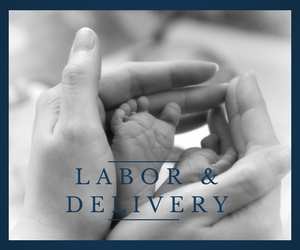If you are like most men, learning that you will soon be a father fills you with many new and sometimes conflicting feelings.
You are probably proud and happy that you will shortly have a child. At the same time, you have doubts about how this will change your life. You may question whether this is the right time to have a child. These are normal feelings. You will, in your own time, resolve these conflicts. This is a special event in your life, and by actively taking part; you can enjoy it to the fullest.
The Importance of Fathers
Much time has been spent studying expectant mothers and pregnancy. In contrast, little time has been given to studying the other half of the parent team the father. Research has shown, however, that fathers play a vital role in the outcome of pregnancy. Too many men feel that once pregnancy has occurred, they can do nothing else until it’s time to bring the mother and baby home from the hospital. This is not true. Studies have shown that women who have supportive partners have fewer problems during pregnancy. Likewise, the process of giving birth, labor and delivery are usually shorter and easier for these women. The move into parenthood can be smoother for both parents if the expectant father takes an active, helpful role in the mother’ s pregnancy
The Process of Pregnancy
AS pregnancy proceeds, many changes take place in an expectant mother. These changes involve emotional as well as physical adjustment to the new life being created. They may affect many aspects of the woman’s lifestyle – work, travel, sex, sleep and eating habits. It is helpful to understand the changes that happen throughout pregnancy.

First Trimester
In the first 3 months, many of the discomforts of pregnancy first occur. Nausea is very common, as is the need to urinate often. Pregnancy women often find that they need more sleep to unction at their best. This might require 10- or 15- minute rest periods during the day.
This is also when most women have mixed feelings about being pregnant; they are subject to mood swings. These feelings may have little or nothing to do with what occurs from day to day, but the feelings are normal.
You can do much to help your partner through this time by understanding that these changes are a natural part of this stage of pregnancy. You should be patient with her needs and moods. This is also a good time to stress positive feelings. Let each other know that pregnancy is trying for both of you, but that the outcome will be worth lt.
Second Trimester

By the beginning of the second trimester, about the fourth month of pregnancy, the process begins to smooth out. The mother’s body, while still growing with the fetus, has become adjusted to the changes that are a part of pregnancy, and she feels more comfortable. During this time, the expectant mother usually begins to enjoy being pregnant. It is a time of planning and sharing for most couples.
Many women need special reassurance during the second trimester. With the increasing change of her shape, a woman needs to know that she’s still feminine and still desirable to her partner. Likewise, this is a time when the expectant father, seeing the change in his partner’s body, wrongly assumes she no longer wants to have sexual relations. Couples express their sexuality in their own unique way, and there is no reason for this to change during pregnancy. Feeling desirable and wanted is even more important right now, as is the need to share warmth and intimacy.
Third Trimester

The third trimester, is often the most difficult, even though it is the closest to birth. The expectant mother is impatient with the pregnancy, tired of being uncomfortable and, not uncommonly, afraid of the upcoming birth. As a result, she often withdraws into herself, leaving the expectant father feeling left out and confused. By understanding that this is a part of pregnancy and not taking it personally, you can be a greater help than you may think. One important thing you can do is to discuss how you can help during the labor and delivery process.
Sex During Pregnancy
In a normal pregnancy—one without complications—sex is generally considered safe. Most couples can continue to have sexual intercourse until shortly before the baby is born.
There are some conditions for which the doctor may advise you to limit or avoid sex for the health of the mother or baby. In most cases, however, sex will not harm the fetus.
The basic guide to sex during pregnancy is the comfort of the expectant mother. You and your partner may want to try different positions to achieve sexual satisfaction. For example, the rear-entry position for vaginal intercourse causes less pressure on the woman’s abdomen and limits the amount of penetration by the man’s penis.
It is important to share your feelings with each other. You may both need to make emotional as well as physical adjustments to continue your usual sexual relationship.
Know Your Obstetrician
Although the specialty of obstetrics is devoted to the care of pregnant women, obstetricians have long recognised that the expectant mother is a part of a family unit. Her family plays an important role in whether she follows medical advice during pregnancy.
Across the country, more fathers are taking an active role in their partners’ pregnancy, labor, and delivery. An essential key to the success a delivery is the opportunity during pregnancy for the expectant father and obstetrician to meet. Such meetings permit the father to gain confidence in the obstetrician and to seek answers to any questions he may have. The obstetrician can get to know the expectant father and enlist his aid in the care of the expectant mother.
When labor begins, a prepared, involved father can contribute the common goal of delivering a healthy, happy baby.
Childbirth Preparation
There are a number of courses that help prepare couples for labor and delivery. Most programs have three components:
- Information about pregnancy and birth
- Exercises and breathing techniques for the mother to use during labor
- Information about the specific role of the father as a coach during labor
- Most obstetricians prefer some courses to others. It is wise for each couple to consult their doctor first for referral to a course in their community.
- Teamwork and confidence take preparation. For the expectant father to be of most help during labor, it is vital that he attend the classes with the mother-to-be and then practice with her at home.
Any questions that have not been answered in childbirth class should be raised to your obstetrician. Doctors want you to be as comfortable and well in-formed as possible. If you have questions, ask.
Labor and Delivery

Most hospitals now permit expectant fathers to be present in both labor and delivery rooms. But some don’t. Part of your preparation should be to find out what your hospital does and does not permit. It is wise to know about this before labor begins. During labor, the father’s role is to provide support and guidance for his partner. As a coach, he can help her carry out the relaxation and breathing exercises they learned and practiced in childbirth class. In this way, the father can take an active role in the birth of his child.
During delivery, the father stands near the head of the delivery table, beside the mother’s shoulder. From this position, he can provide emotional and physical support. He also is able to see the birth of his child just as the mother does.
On occasion, situations arise that require the doctor’s full attention, and you may be asked to leave the delivery room. In the best interest of the mother and baby, you should trust your doctor’s judgment and leave right away, without discussion.
All fathers may not want to get involved in the delivery. They should not feel inadequate because of this but should make an extra effort to become involved in other ways. A father can lend support beforehand during childbirth preparation and afterward by assuming an active role in caring for the mother and baby right after delivery. Caring can take many forms, and the father’s role is especially important in the family-centered approach to childbirth.
After delivery, most hospitals now provide for mother, father, and baby to spend some time together. They understand that this moment is the end of a long wait and the beginning of a new life for baby and parents.
PREPARING FOR FATHERHOOD
Becoming a father is more than the act of co-creating a baby and watching the birth. Fatherhood is recognized more and more as the important counterpart to motherhood.
How much you choose to participate in the care of your newborn will depend on you. But you can prepare for it just as you prepared for childbirth—by reading and by attending preparation courses. The more you know, the more you have to offer your child. Some fathers complain that they feel left out after the baby arrives because the mother spends so much time and energy caring for the child. Fathers who choose to become actively involved in their baby’s care report exactly the opposite experience—they feel closer than ever to their partner and child.
Finally . .
Having a baby is a family affair. Fathers are important parents, right from the beginning. The role you play, from pregnancy to labor to delivery and throughout your child’s life, can be as involved as you make it.



Add a Comment